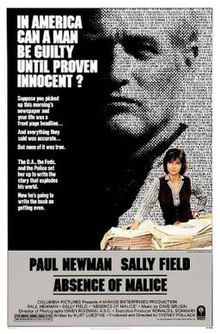
Paul Leonard Newman was an American actor, film director, racing driver, philanthropist, and entrepreneur. He was the recipient of numerous awards, including an Academy Award, a BAFTA Award, three Golden Globe Awards, a Screen Actors Guild Award, a Primetime Emmy Award, a Silver Bear, a Cannes Film Festival Award, and the Jean Hersholt Humanitarian Award.
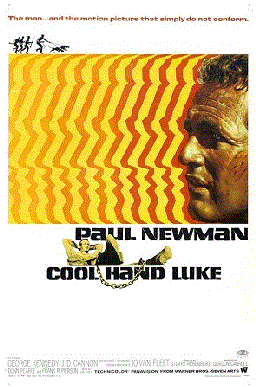
Cool Hand Luke is a 1967 American prison drama film directed by Stuart Rosenberg, starring Paul Newman and featuring George Kennedy in an Oscar-winning performance. Newman stars in the title role as Luke, a prisoner in a Florida prison camp who refuses to submit to the system. Set in the early 1950s, it is based on Donn Pearce's 1965 novel Cool Hand Luke.
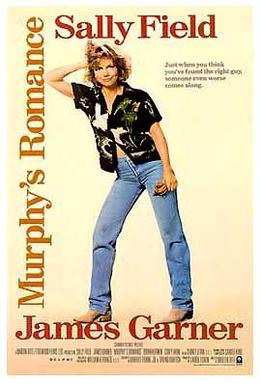
Murphy's Romance is a 1985 American romantic-comedy film directed by Martin Ritt. The screenplay by Harriet Frank Jr. and Irving Ravetch was based on the 1980 novella by Max Schott. The film stars Sally Field, James Garner, Brian Kerwin, and Corey Haim, and was produced by Laura Ziskin for Field's production company Fogwood Films.

Richard E. Roeper is an American columnist and film critic for the Chicago Sun-Times. He co-hosted the television series At the Movies with Roger Ebert from 2000 to 2008, serving as the late Gene Siskel's successor. From 2010 to 2014, he co-hosted The Roe and Roeper Show with Roe Conn on WLS-AM. From October 2015 to October 2017, Roeper served as the host of the FOX 32 morning show Good Day Chicago.

Matthew Raymond Dillon is an American actor. He has received various accolades, including an Academy Award nomination and Grammy nomination.

Over the Edge is a 1979 American coming-of-age crime drama film directed by Jonathan Kaplan and released in May 1979. The film, based on actual events, had a limited theatrical release but has since achieved cult film status. It was Matt Dillon's film debut.

Anthony Wilford Brimley was an American actor. After serving in the U.S. Marine Corps and working odd jobs in the 1950s, Brimley started working as an extra and stuntman in Western films in the late 1960s. He became an established character actor in the 1970s and 1980s in films such as The China Syndrome (1979), The Thing (1982), Tender Mercies (1983), The Natural (1984), and Cocoon (1985). Brimley was known for playing characters at times much older than his age. He was the long-term face of American television advertisements for the Quaker Oats Company. He also promoted diabetes education and appeared in related television commercials for Liberty Medical.
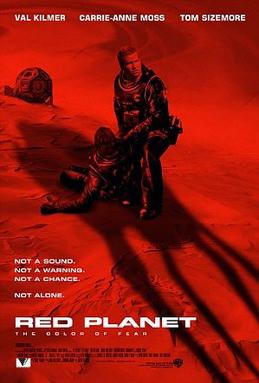
Red Planet is a 2000 science fiction action film directed by Antony Hoffman. The film stars Val Kilmer, Carrie-Anne Moss, and Tom Sizemore.
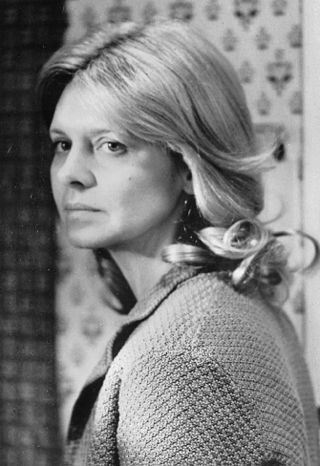
Melinda Ruth Dillon was an American actress. She received a 1963 Tony Award nomination for her Broadway debut in the original production of Who's Afraid of Virginia Woolf?, and she was nominated for the Academy Award for Best Supporting Actress for her roles as Jillian Guiler in Close Encounters of the Third Kind (1977) and Teresa Perrone in Absence of Malice (1981). She is well known for her role as Mother Parker in the holiday classic A Christmas Story (1983). Her other film roles include Bound for Glory (1976), Slap Shot (1977), F.I.S.T. (1978), The Muppet Movie (1979), Harry and the Hendersons (1987), Captain America (1990), The Prince of Tides (1991), To Wong Foo, Thanks for Everything, Julie Newmar, How to Make an American Quilt, Magnolia (1999), for which she was nominated for a Screen Actors Guild Award, and Reign Over Me (2007).

Coffy is a 1973 American blaxploitation film written and directed by Jack Hill. The story is about a black female vigilante played by Pam Grier who seeks violent revenge against a heroin dealer responsible for her sister's addiction.

Richard Nelson Corliss was an American film critic and magazine editor for Time. He focused on movies, with occasional articles on other subjects.
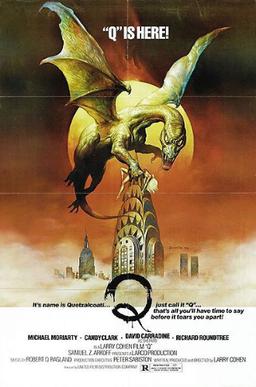
Q – The Winged Serpent is a 1982 American monster horror film written, co-produced and directed by Larry Cohen and starring Michael Moriarty, Candy Clark, David Carradine and Richard Roundtree. The film follows a petty swindler (Moriarty) who accidentally intrudes in a case involving a winged deity monster that poses a threat to New York City. He is the only person who has information that can help the police to stop the creature.

Richard Warren Schickel was an American film historian, journalist, author, documentarian, and film and literary critic. He was a film critic for Time from 1965–2010, and also wrote for Life and the Los Angeles Times Book Review. His last writings about film were for Truthdig.
The 7th Los Angeles Film Critics Association Awards, honoring the best filmmaking of 1980, were announced on 14 December 1981 and given on 13 January 1982.
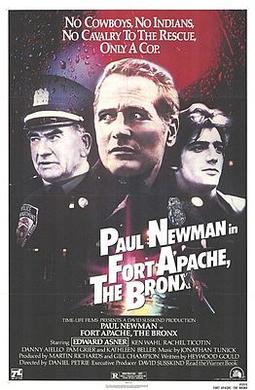
Fort Apache, The Bronx is a 1981 American crime drama film directed by Daniel Petrie. The film stars Paul Newman as Murphy, a hard-drinking, lonely veteran cop, and Ken Wahl as his young partner, Corelli, both of whom work in a crime-ridden precinct in the Bronx. Although Murphy's life takes a good turn when he falls in love with young nurse Isabella, the arrival of police captain Connoly threatens to tip the neighborhood's delicate balance into anarchy. Danny Aiello, Kathleen Beller and Pam Grier play supporting roles. The film was written by Heywood Gould and produced by Martin Richards and Thomas Fiorello, with David Susskind as executive producer.

The Natural is a 1984 American sports film based on Bernard Malamud's 1952 novel of the same name, directed by Barry Levinson, and starring Robert Redford, Robert Duvall, Glenn Close, Kim Basinger, Wilford Brimley, Barbara Hershey, Robert Prosky and Richard Farnsworth. Like the novel, the film recounts the experiences of Roy Hobbs, an individual with great "natural" baseball talent, spanning the decades of Roy's career. In direct contrast to the novel, the film ends on a positive tone. It was the first film produced by TriStar Pictures.

Harry & Son is a 1984 American drama film directed by Paul Newman, who also stars. The screenplay by Newman and Ronald Buck focuses on the relationship between a blue-collar worker and his son, who fails at various odd jobs while aspiring to be a writer. Joanne Woodward, Ellen Barkin, Ossie Davis, Wilford Brimley, and Judith Ivey also star. The film also features Morgan Freeman.

For the Love of Movies: The Story of American Film Criticism is a 2009 documentary film dramatizing a hundred years of American film criticism through film clips, historic photographs, and on-camera interviews with many of today’s important reviewers, mostly print but also Internet. It was produced by Amy Geller, written and directed by long-time Boston Phoenix film critic Gerald Peary, and narrated by Patricia Clarkson. Critics featured include Roger Ebert of The Chicago Sun-Times, A.O. Scott of The New York Times, Lisa Schwarzbaum of Entertainment Weekly, Kenneth Turan of The Los Angeles Times, and Elvis Mitchell, host of the public radio show The Treatment.
Journalism has been depicted frequently throughout the 20th century in American pop culture media, such as motion pictures and television. For decades, movies about journalism either have criticized bad journalism or celebrated good journalism. Since the 1930s, more than 100 films have had a journalism theme or recounted journalism history. Because of the early 20th century beginnings in the newspaper industry in the United States, these films focused on the print industry. After the 1976 release of “All the President's Men,” an increased number of young people inspired by the watchdog and investigative function of newspapers entered journalism programs at colleges and universities. As television and radio news launched into prominence in the 1960s and later, more movies about broadcast journalism were produced.
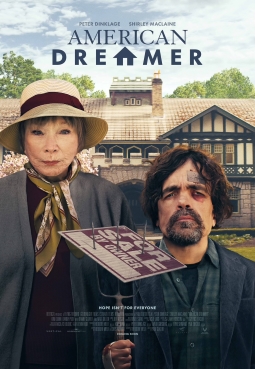
American Dreamer is a 2022 American black comedy film directed by Paul Dektor and written by Theodore Melfi. Based on a segment from the radio show This American Life, it stars Peter Dinklage as a professor who tries to buy the estate of a lonely widow played by Shirley MacLaine. Kim Quinn, Danny Pudi, Danny Glover, and Matt Dillon also star.
